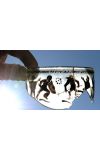
19 Jun 2013 00:34:36
They dismantled and burned their fort. Then they dug a large hole into which they dumped their most precious metal items: 763,840 2in nails, 85,128 medium nails and 25,088 large nails. "These had held the fort together and would have been as useful as leaving a cache of weapons, so the Roman troops buried them," writes Mark Miodownik, professor of materials and society at University College London. All other steel items were taken south: weapons, armour – and the soldiers' razors, which "allowed the Romans to retreat clean-shaven, groomed in order to distinguish them from the savage hordes that had driven them out".
It is an intriguing observation. From this perspective, outlined by Miodownik, Roman civilisation appears to be the result not of advanced military expertise, but of an ability to manufacture and mould superior materials, in this case high-quality steel.
Nor is Miodownik short of other examples. Consider concrete. The Romans invented the stuff. Using cement from Pozzuoli near Naples, which they mixed with small rocks, they constructed ports, bridges, aqueducts and the rest of their empire's infrastructure. Best of all, they used it to build the dome of the Pantheon in Rome. Still standing today, it is 2,000 years old but remains the largest unreinforced concrete dome in the world.
Then there is glass. Both the Egyptians and Greeks manufactured it. However, the Romans perfected glass-making and brought it into everyday life – with profound consequences. "Before the Romans, windows were open to the wind (the word means 'wind eye')", we are told. Glass changed that experience and also transformed our appreciation of wine, after the Romans started using glass to create drinking vessels which had previously been made of opaque materials such as metal, horn or ceramic. As Stuff Matters tells us: "The invention of drinking glasses meant that the colour, transparency and clarity of their wine became important too." Certainly, from this perspective, it's not hard to pinpoint what the Romans have done for us.
There is more, however. The Chinese, although highly proficient at manufacturing steel, porcelain and paper, never quite got the hang of glass. Yet it led to the invention of the telescope and the microscope, each critical to the scientific and medical revolutions that started in the west but which failed to ignite in China. And you can see why. Without a telescope, you cannot observe Jupiter's moons and make measurements that underpin an understanding of the universe. And without a microscope, you cannot see bacteria and understand their role in the spread of disease.
In short, a proficiency with materials has consequences, a point expertly illustrated in this deftly written, immensely enjoyable little book. A vast library of modern materials underpins our lives today and makes them bearable: chocolates that are artfully structured to explode like taste-bombs in our mouths; silica aerogel, the world's lightest solid, which is actually 99.8% air and which provides almost perfect thermal insulation; and carbon-fibre technology, which has transformed sports including cycling, tennis and Formula One, and which might be used one day to construct a "space ladder", an elevator that would rise from Earth's equator to a satellite, carrying passengers and tourists.
Our awareness of the importance of materials is also revealed by the names we have given to the key stages of civilisation: the stone age, the bronze age and the iron age. The steel age probably arrived with the Victorians, while we can consider ourselves to be in the silicon age today. Who knows what will follow.
Whatever it is, it will define our world. As Miodownik says: "We may like to think of ourselves as civilised but that civilisation is in large part bestowed by material wealth. But without this 'stuff', we would quickly be confronted by the same basic struggle for survival that animals are faced with."

